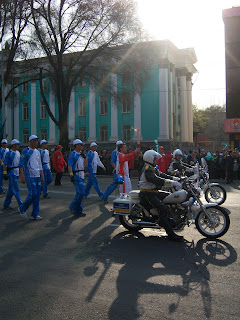
Unlike back in the US, where vodka can be an upscale beverage, here in Central Asia it is all about finding a unique niche in an otherwise crowded field. The best way to do so is not to produce the best product possible. Rather, it is all about unique marketing of some barely palatable vodka. Over the last months, my friends and I have made a study of some of these finer beverages. I’m listing some of our favorites (?) below—and should note that all three of these bottles cost approximately $11, which is the same price as a somewhat decent bottle of “Gdzelka”—the local version of Grey Goose. It is hard to resist some of the crazier packaging, though—hence the collection of inexpensive and pretty bad beverages. Just in case you are wondering, the collection of bottles started back in October—they are NOT all recent acquisitions!
1. Manly strength vodka—their slogan is something along the lines of “we will not be able to say much about the qualities of our vodka or that it is recommended by kings and wise men. But let your wife tell you about the qualities of our vodka”. Price—325 tenge ($2.70)
2. 100 пудов Vodka—which we do not know how to translate, since “пуд” (pood) is not in any of our dictionaries. Instead, we have called it Thumbs Up Vodka, for apparent reasons. Price—445 tenge ($3.70)
3. Bread Wine—a novel way to view vodka! Clearly, if you only have a few tenge left, this is the choice for you as it eliminates the need to buy both vodka and bread. It is a little pricey, but worth it since it serves a dual purpose. Price—550 tenge ($4.58)
I leave it to you to decide—could you pass up these fancy bottles for something a little more palatable? If the answer is yes, you could—well, live in Central Asia for a while. Your answer then just might surprise you!
1. Manly strength vodka—their slogan is something along the lines of “we will not be able to say much about the qualities of our vodka or that it is recommended by kings and wise men. But let your wife tell you about the qualities of our vodka”. Price—325 tenge ($2.70)
2. 100 пудов Vodka—which we do not know how to translate, since “пуд” (pood) is not in any of our dictionaries. Instead, we have called it Thumbs Up Vodka, for apparent reasons. Price—445 tenge ($3.70)
3. Bread Wine—a novel way to view vodka! Clearly, if you only have a few tenge left, this is the choice for you as it eliminates the need to buy both vodka and bread. It is a little pricey, but worth it since it serves a dual purpose. Price—550 tenge ($4.58)
I leave it to you to decide—could you pass up these fancy bottles for something a little more palatable? If the answer is yes, you could—well, live in Central Asia for a while. Your answer then just might surprise you!
